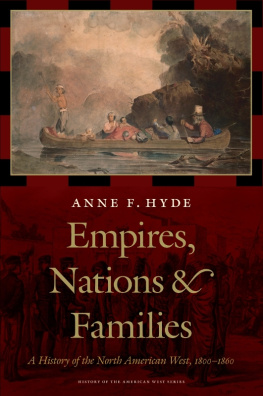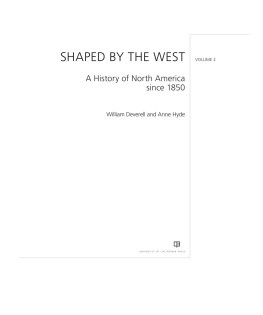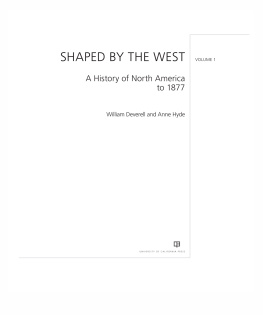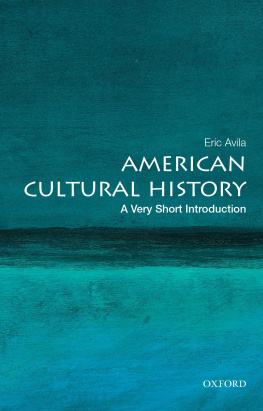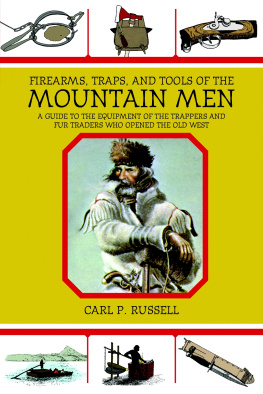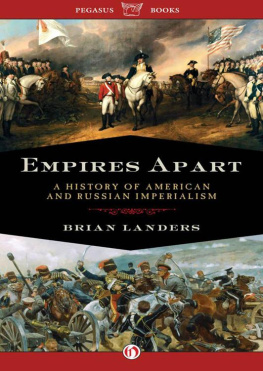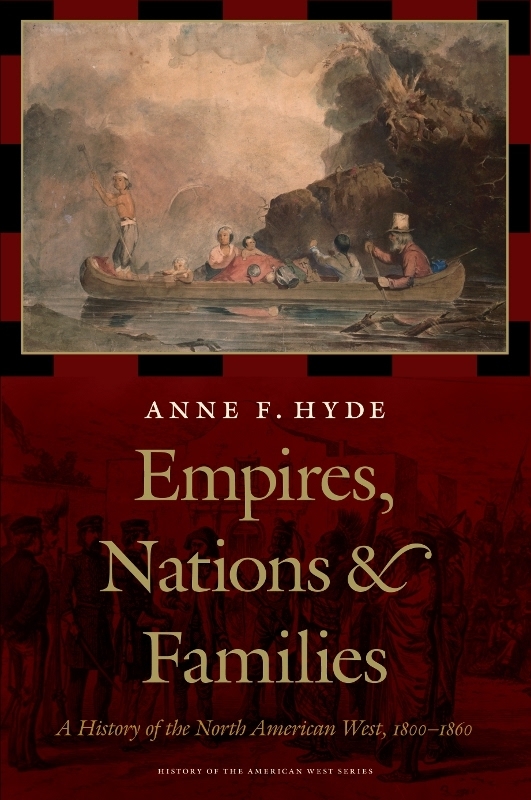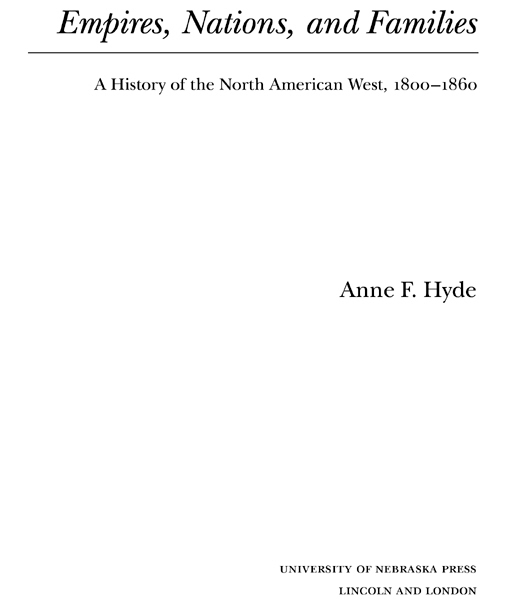Richard W. Etulain, University of New Mexico
Publication of this volume was assisted by The Virginia Faulkner Fund, established in memory of Virginia Faulkner, editor in chief of the University of Nebraska Press.
Anne F. Hyde.
ISBN 978-0-8032-2405-6 (cloth: alk. paper)
1. West (U.S.)Social conditions19th century. 2. West (U.S.)Commerce
History19th century. 3. FamiliesWest (U.S.)History19th century. 4. Fur tradeSocial aspectsWest (U.S.)History19th century. 5. Fur tradersFamily relationshipsWest (U.S.)History19th century.
6. Frontier and pioneer lifeWest (U.S.)
7. Indians of North AmericaSocial conditionsWest (U.S.)History19th century.
8. Indians of North AmericaCommerceWest (U.S.)History19th century. 9. Mexican War, 18461848Social aspectsWest (U.S.) I. Title.
George Caleb Bingham, Daniel Boone Escorting Settlers through the Cumberland Gap, 185152
George Caleb Bingham, The Squatters, 1850
George Caleb Bingham, Fur Traders Descending the Missouri, 1845
Aaron Arrowsmith, 1811 map of North America
Saint-Mmim, White Hair, Osage chief, 1807
The Chouteau Family and their Osage relations
1830
Sublette and Hereford/Wilson/Yorba family trees
Margaret Sale Hereford Wilson, 1874
Benjamin Davis Wilson, 1855
Hereford-Wilson wedding photograph, 1853
Marguerite Wadin McKay McLoughlin, 1857
Fort Vancouver, 1845 drawing
Dr. John McLoughlin, 1848
Lt. James Abert, Scalp Dance at Bents Fort, 1846
Lt. James W. Abert, Sketch of Bents Fort, 1845
Mariano Guadalupe Vallejo, ca. 1868
Drawing of Sutters Fort, 1847
William Howard, portrait of Stephen F. Austin, 1833
Charles Bird King, portrait of Cornplanter, 1830s
George Catlin, Clermont, Osage 1830s
George Catlin, Wah-Chee-te and Child, 1830s
Charles Deas, The Trapper and His Family, 1840s
Cynthia Ann Parker, 1860
and Statistics of the Several Indian Tribes, 1851
George Catlin, Two Comanche Girls, 1834 296
Indians Who Worked for Phineas Banning, ca. 1853
Edwin Denig and Deer Little Woman, ca. 1855
Medicine Snake Woman
Nauvoo temple in Nauvoo, Illinois, 1846
Rudolf Friedrich Kurz, Returning from the Dobies Ball, 1850
Comanche Council at San Antonio, ca. 1853
Jaramillo Carson holding child, ca. 1850
Charles R. Savage, Mormon child, 1858
Margaret and Maggie Hereford Wilson, painting, 1856
Mass hanging of Sioux at Fort Snelling, Harpers, 1863
William Bent with Left Hand and three family members, 1867
Four generations of Vallejo women, ca. 1875
Napoleon Vallejo, 1863
Maria Jess Wilson and Dora Hereford, 1860
Bernardo Wilson, ca. 1856
Concomeleys tomb, 1841
David McLoughlin, 1900
The Early North American West and Its Shifting Imperial Claims
Native Nations and the Chouteau Family Trade Network
Missouri and Rocky Mountain Fur Trade, 182040
Canadian Fur Trade World, 17801840
Our Neighborhood: The Borderlands of Spain, Mexico, and Native Nations, 182140
The Santa Fe Trail, Southern Plains, and Their Residents
in 1783
Indian Country and Its Shifting Borders, 180340
Mexico, Texas, and the Comanche Borderlands, 183048
A Theater of War: The U.S. Wars with Mexico, 184550
Nations at War: Indian Wars in the West, 184865
Native People, Wars, and Reservations in the Pacific Northwest, 184060
Adventures in the Land of the Dead
This book has its own history. I grew on it, and life interfered with writing it, so it took a while. I have a particular perspective that is partly training, partly experience, and partly personal. Ive been a historian, a teacher, a parent, a wife, a daughter, a friend, and Ive been embedded in various communities for a long time. These relationships form my relationship with the past. I can, I think, empathize with Marguerite McLoughlin as she watched her young children head off for school, knowing she might not see them for years at a time, or with the worry Island Bent felt about what might happen to her children if she were not there to protect them. I teach at a small liberal arts college where research is important, but the intellectual and personal relationships I build with students matter more. We spend a lot of time talking about what history is and why it might matterdaily practice in perspective taking and in endless revision. These conversations have certainly influenced how I chose to tell this story.
The progressive historian Charles Beard gave us good advice in his presidential address to the American I read that essay almost every year with my students, and it still resonates deeply about the responsibility we have to the past to retell it with faith in the present.
The nexus of families and relationships that undergirds this book has its own structural supporta dense web of scholarship that has emerged over the past twenty-five years. I have the privilege of donning lenses that literary theorists, ethnographers, critical race theorists, gender scholars, and anthropologists have designed for us to have a new view. How we have thought about power, nations, and families has shifted seismically, and I have benefited from my opportunity to read and think broadly. I have a long list of what I call just-in-time books that I read just at the right moment to understand what I was seeing in the record and what I was trying to describe. Im grateful to all of those historians who worked so hard to make the trans-Mississippi West such an untidy place and all of those scholars who had no idea that their work on Australia, Morocco, France, China, Chile, or England would make the North American West look so different. Im very grateful to those western presses that continue to publish the books and documents that make this research possible and exciting.
I got much support from Colorado College. The Social Science Division funded much of this research, as did the Hulbert Center for Southwest Studies and Cosgrove Funds in the History Department. Dean Susan Ashley helped me out with a leave for writing and provided resources to hire two fabulous research assistants, Tessa Cheek and Kelsey Speaks, who checked footnotes, typed bibliographies, and organized me.
More specifically, I need to thank the people who helped me imagine, research, and write and rewrite this book. Librarians at Colorado College have provided me with a place to work and wonderful help and have always made my life easier and better. Robin Satterwhite, Julie Jones-Eddy, and Diane Brodersen patiently tracked down materials from everywhere, and LaDreka Davis and Mike McEvers found books and work space with grace and humor. Beyond this home turf, I worked at four wonderful institutions and, with the help of their talented and knowledgeable staffs, found incredibly rich materials. Close to home the Denver Public Library and the Colorado Historical Society provided many resources. George Miles and the Beinecke Library at Yale offered a great place to begin my research, and the Missouri Historical Society in St. Louis yielded innumerable treasures about the fur trade and its cast of characters. In California I worked mostly at the Huntington Library, making three different research trips there. Finally I had the gift of a two-month fellowship at the Huntington as a Caughey Western History Fellow that allowed me to finish a full draft. On each visit Peter Blodgett and Jenny Watts provided timely and wise advice about materials and approaches, and Suzi Kraznoo and Roy Ritchie made the visits possible and fun.

